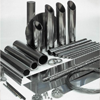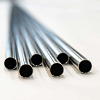Внимание: осторожно мошенники!
От имени Чепецкого механического завода в адрес предприятий и организаций стали приходить поддельные документы (срочные уведомления, заявки на аукционы и т.п.).
Неизвестные лица рассылают фиктивные заявки о проведении аукционов (например, на право заключения договора поставки нержавеющего металлопроката для нужд АО ЧМЗ). При этом, мошенники используют подложные бланки, несуществующую печать АО ЧМЗ, ставят поддельные подписи действующих сотрудников коммерческой службы, а также подписываются сотрудниками вымышленных отделов (например, отдел закупок срочных аукционов АО ЧМЗ).
Официально заявляем, что Чепецкий механический завод к такого рода документам не имеет никакого отношения.
Убедительно просим проверять поступающую документацию, якобы направленную от имени АО ЧМЗ. Для проверки информации необходимо связываться с официальными коммерческими службами Чепецкого механического завода по тел. (341-41) 9-64-22.
Пример поддельного документа
Rosatom’s Superconductors Successfully Tested for Future Colliders
16.06.2021
The European Organization for Nuclear Research (CERN, Switzerland) has successfully completed the acceptance testing of Russian-made niobium-tin superconductors made in the framework of the Future Circular Collider (FCC) CERN Conductor Development Program.
The design of superconducting strands and their manufacturing technology were developed at the Bochvar Institute in Moscow, while the 50 km long qualification batch of strands was manufactured at the Chepetsky Mechanical Plant in Glazov, Udmurt Republic (both enterprises are subsidiaries of TVEL Fuel Company of Rosatom). The tasks were completed under the agreement between TVEL and CERN, and based on the successful testing results, TVEL results as a potential future supplier of wire for high field magnet accelerator programs.
The high performance of the wire fully complies with the CERN specification. CERN has also produced Rutherford cables with the delivered wires. The tests have achieved the record-breaking results for the Russian superconductivity technologies, including the critical current density in electromagnetic field, residual resistivity ratio, as well as effective diameter of the strand.
The magnet system is one of the key elements of the “Collider of the future”. The FCC’s termendous dimensions (its circumference is about 100 km) would require significant supply of superconducting strands, which can only be provided through joint efforts of the countries possessing such technology (according to professional assessments, the FCC's needs for superconductors would greatly exceed the existing global capacities of the niobium-tin strand production). At the same time, the potential future construction of the FCC, which is proposed to be in Switzerland, is a key international project of the global scientific community. Its implementation would allow scientists to bring fundamental research in elementary particle physics to a new level. In particular, it will help understand the nature of dark matter, the antimatter-matter asymmetry in the observable Universe, and other issues beyond the framework of the so-called Standard Model of modern physics.
Differently from Rosatom’s superconductors for the ITER project, the strands for the FCC have been developed based on the internal tin source method, allowing for manufacturing a strand with significantly higher critical current density, which is necessary for modern magnetic systems for accelerators and high-energy physics systems.
“Researchers and engineers of the Fuel Division of Rosatom have once again proved their high class expertise in superconductivity by developing a technology and manufacturing a product featuring advanced world level performance in a short time. We are proud that our superconductors will make possible the implementation of the major Russian and international megascience projects, such as FCC, ITER, NICA and FAIR. In addition to niobium-tin strands, we are also developing niobium-titanium strands for the Future Collider, as well as ultrapure resonator niobium, which will be required to manufacture the collider accelerating systems”, Natalya Nikipelova, President of TVEL JSC, commented.
Applied superconductivity is one of the strategic fields of non-nuclear technology developments at TVEL. In addition to fundamental science projects, low-temperature superconducting materials are indispensable for development of modern medical equipment (magnetic resonance imaging systems), as well as for analytical equipment of high and ultra-high resolution, such as NMR spectrometers. A task of primary importance for the superconductivity technologies development is development of high-temperature superconducting materials, which will significantly improve the performance of conventional electrical and power industry devices.
Background:
The development of the CERN-compliant strand for FCC project is also underway in the United States, Europe, South Korea, Japan and China. TVEL, Rosatom’s Fuel Division, is the only developer and manufacturer of low-temperature technical superconductors in Russia. The High-tech Research Institute of Inorganic Materials named after A.A. Bochvar is developing designs and manufacturing technologies for superconducting strands based on ultrapure niobium and its alloys.
The introduction of the strands commercial production is underway at the Chepetsk Mechanical Plant (ChMP JSC). ChMP JSC set up the manufacturing of low-temperature superconduting materials as part of Russia's participation in the ITER (the International Thermonuclear Experimental Reactor) construction project in France. For the period from 2009 to 2014, the facility produced more than 200 tons or 61 thousand km of low-temperature superconductors for ITER.
At the end of 2020, due to niobium-titanium superconductors developed and manufactured by the Fuel Division if Rosatom it became possible to achieve the design values of the magnetic field of the heavy ion booster which is a part of the first stage of the NICA project, a megascience accelerator facility in Dubna.
TVEL Fuel company of Rosatom (Fuel Division of the Rosatom State Corporation) includes enterprises for fabrication of nuclear fuel; conversion and enrichment of uranium, production of gas centrifuges. It also includes the research and development organizations. TVEL is the only supplier of nuclear fuel for Russian nuclear power plants; moreover, it supplies, in total, the fuel for 75 power reactors in 15 countries, and for the research reactors in 9 countries of the world, as well as for the fleet reactors of the Russian nuclear fleet. Every sixth power reactor in the world runs on TVEL fuel. The Fuel Division of Rosatom is the world's largest manufacturer of the enriched uranium.
The Fuel Division is actively developing new business lines in chemistry, metallurgy, energy storage technologies, 3D printing, digital products, as well as decommissioning of nuclear facilities. Recently, the TVEL Fuel Company structure was enlarged by the Rosatom's branch integrators for additive technologies and energy storage systems. http://www.tvel.ru
Просмотров: 352







